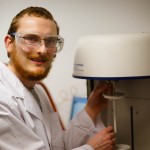
Chris Desire
Separation Scientist
Australian Centre for Research on Separation Science
I wasn’t always interested in science, but it was first recommended to me when I was young, as a way to keep my career options open. As it turns out, that was the best advice I could have received, because now I can’t get enough of it! Science fiction has also been a major influence on the direction of my career, as the development of new and exciting materials may allow some of those extravagant technologies to become possible.
Science is a diverse, ever-changing field, where we apply the scientific method to solve problems, face challenges and make new discoveries.
I completed my Bachelor of Science at the University of Tasmania specialising in both chemistry and physics, before completing an Honours project in chemistry. I have a fascination for where chemistry meets physics, with a keen interest in how small components can come together to form complex systems, often with specific functions.
Perhaps this is why I was drawn to polymer science. Polymers can essentially be thought of as large molecules made up of a large number of smaller units. The identity of these units and how they are put together (for example their order and/or architecture) can result in unique properties, making polymers useful for a wide range of applications. What I love most about them is that they are present in our everyday lives; a few examples include credit cards, cookware, some ropes, coffee cups, bottles, some eyeglass lenses, and contact lenses. Polymer composites are even used in aircraft.
My research project and main interests lie with the preparation of porous polymers (you can think of these as solid materials with “holes”) and how they can be used in the separation of important and often complicated mixtures. As an example in my Honours year, I looked at using these materials for the separation of important biomolecules relevant in the pharmaceutical industry.
I am currently working as part of a research group that looks at the preparation of a new class of porous polymers for separation science. I hope that one day our work will yield new and exciting materials that can improve our everyday lives.
For more information: www.utas.edu.au/across